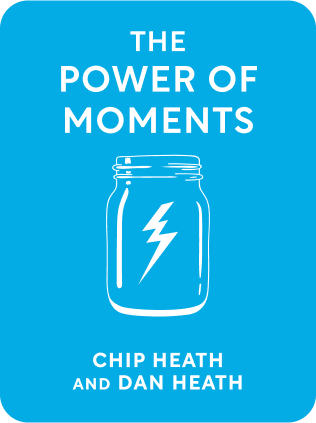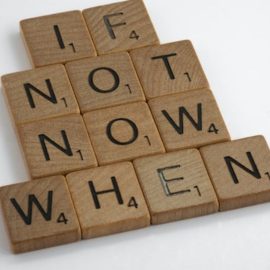

This article is an excerpt from the Shortform book guide to "The Power of Moments" by Chip Heath and Dan Heath. Shortform has the world's best summaries and analyses of books you should be reading.
Like this article? Sign up for a free trial here .
Do you celebrate your small wins? Why is it important to celebrate small achievements on the way towards a big goal?
Celebrating small wins sparks powerful feelings of accomplishment and motivation and serves to remind you of the value of your hard work. Studies have also shown that continuously celebrating small wins achievements is a fairly easy way to boost your overall happiness—it’s much easier to continue pursuing a goal when it feels good, or even fun, rather than like a chore.
Here is how to build small wins into the path towards your goal.
Build Small Wins Into the Path to Your Goal
Big goals often come with big flaws. First, there is usually no clear route between Here and There, making it all too easy to get lost or demotivated along the way. Second, big goals are often far too ambiguous to actually be achievable, such as, “I want to learn Spanish,” or, “I want to lose weight.”
(Shortform note: Recall the fixed mindset and growth mindset discussion from Carol S. Dweck’s Mindset: Those with a fixed mindset often only care about the achievement of the goal, and those with a growth mindset can more easily see the value of the journey. The strategy of celebrating small wins is helpful because it caters to both of these mindsets. The frequent achievements cater to those with a fixed mindset, and the value placed on the pursuit of a goal caters to those with a growth mindset.)
Defeating a challenge makes for a big moment of pride and all the positive emotions that come with accomplishment. However, that big moment of success often never comes to pass without a plan for smaller occasions for pride that will keep you motivated. In pursuit of a goal, you should build in small reasons to celebrate—or small wins—along the way to your destination. Going about your goal this way serves several purposes:
- Your goal is reframed as a tangible destination, and the small steps give you a sort of roadmap to get there.
- Your small wins are concrete and feel attainable—you are more likely to put in effort on an achievement that seems within reach.
- Each small win celebrated will provide you with a new burst of pride. In this way, you allow yourself multiple opportunities to feel good about your abilities, instead of feeling frustrated and defeated when you can’t achieve the huge leap between Here and There.
Example: Losing Weight With Small Wins
To learn what built-in milestones might look like for you, let’s take the “I want to lose weight” example. You can decide between two different approaches:
Approach A
- Exercise and eat healthy
- Exercise and eat healthy
- Exercise and eat healthy
- Buy a too-small pair of “motivation” jeans?
- Exercise and eat healthy
Result: Someday, maybe, you’ll lose the weight.
Approach B
- Start taking the stairs instead of the elevator
- Go 30 straight days without soda (then, can you do 30 more?)
- Test healthy recipes, find five that even the kids will eat
- Get a group at work together for a daily lunchtime walk, go out for a drink whenever you all hit 10,000 steps for the day
- Log 50 Zumba classes
Result: You get to start wearing your favorite jeans again.
Of these two approaches, which one would be more fun? Which one gives you more occasions to celebrate? Which one gives you tangible achievements that naturally build toward your greater goal? Most importantly—which one would you be more likely to stick with?
| How to Set Up Your Small Wins The Heaths stress that your small wins should be tailored to your journey and your particular motivations. There are three steps you can take to plan out a journey that makes sense to you and keeps you moving in the right direction. 1) Think about what’s meaningful to you. In The Happiness Advantage, Shawn Achor suggests that when setting a goal, you think about incremental achievements that will consistently remind you of the meaning and importance of the journey. This will help shift your focus away from the stress of achieving planned results. A helpful question to help you come up with these achievements is, “What types of small wins will increase my confidence and knowledge?” 2) Decide where to begin. In their book Switch, the Heaths talk about the power of “shortening the distance” to your goal—in other words, you can list as one of your small wins something you’ve already accomplished, so you have something to celebrate right away. The knowledge that you’ve already achieved a milestone makes the goal seem closer and more achievable. 3) Make sure your wins are small. In Essentialism, Greg McKeown explains that the most effective way to stay motivated on the way to a goal is to space your small wins close enough together that you feel that you are making progress nearly constantly—moving forward feels almost effortless. To design a system that feels almost effortless, make sure that each of your wins is only a very small indicator of progress and investment of time above the previous small win. |

———End of Preview———
Like what you just read? Read the rest of the world's best book summary and analysis of Chip Heath and Dan Heath's "The Power of Moments" at Shortform .
Here's what you'll find in our full The Power of Moments summary :
- How to make everyday experiences meaningful and memorable
- A look at the four elements that create meaning
- How your senses can play a role in elevating everyday moments






